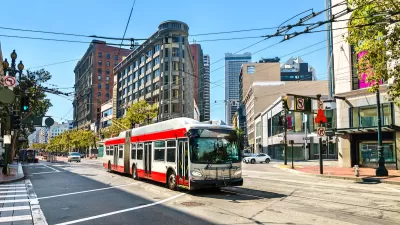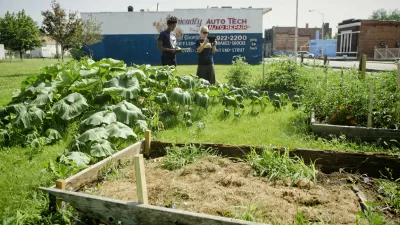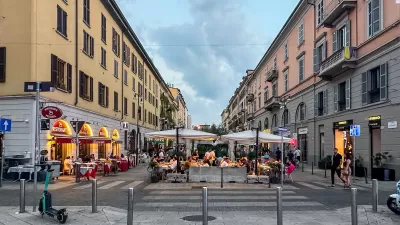Often, participants in public debates use words to mean things very different from their common-sense meanings, in order to manipulate the public’s emotions. Two examples in the field of urban planning come to mind.
Often, participants in public debates use words to mean things very different from their common-sense meanings, in order to manipulate the public's emotions. Two examples in the field of urban planning come to mind.
Road lobby supporters claim to be for "mobility." In their lingo, "mobility" means "the ability to drive as fast as possible." But in common English, mobility means the ability to move from place to place generally. The two concepts are quite different because sometimes, policies designed to improve drivers' mobility impede mobility for others. For example, if a two-lane, slow-traffic street is widened to ten lanes, pedestrians may not be able to safely cross that street. Thus, those pedestrians are actually rendered less mobile by ostensibly pro-"mobility" policies. Similarly, if a new road shifts development to a place without public transit, transit-dependent job-seekers are effectively rendered less mobile, since they cannot easily reach jobs in the newly created "edge city." Fast car traffic may have its virtues, but it is not the same thing as mobility for all.
But environmentalists are also adept in manipulating the language. A common environmentalist buzzword is "sustainability." In environmentalist lingo, "sustainable" really means "environmentally sound" - a policy that ought to be adopted or a design that ought to be imitated. But according to dictionary.com, "sustainable" does not mean something that should be sustained; rather, it means "capable of being sustained. " Now, I would love to believe that sprawl cannot be sustained. But if I did, I probably wouldn't waste time writing about why it shouldn't be; instead, I would declare victory, seek an alternative career, and spend my days in giddy celebration of our glorious (or at least pedestrian-friendly) future. By confusing what ought to be sustained ("sustainable" in the sense environmentalists use the term) with what is likely to be sustained ("sustainable" in the dictionary sense of the term) environmentalists mangle the English language.

Planetizen Federal Action Tracker
A weekly monitor of how Trump’s orders and actions are impacting planners and planning in America.

Maui's Vacation Rental Debate Turns Ugly
Verbal attacks, misinformation campaigns and fistfights plague a high-stakes debate to convert thousands of vacation rentals into long-term housing.

San Francisco Suspends Traffic Calming Amidst Record Deaths
Citing “a challenging fiscal landscape,” the city will cease the program on the heels of 42 traffic deaths, including 24 pedestrians.

Amtrak Rolls Out New Orleans to Alabama “Mardi Gras” Train
The new service will operate morning and evening departures between Mobile and New Orleans.

The Subversive Car-Free Guide to Trump's Great American Road Trip
Car-free ways to access Chicagoland’s best tourist attractions.

San Antonio and Austin are Fusing Into one Massive Megaregion
The region spanning the two central Texas cities is growing fast, posing challenges for local infrastructure and water supplies.
Urban Design for Planners 1: Software Tools
This six-course series explores essential urban design concepts using open source software and equips planners with the tools they need to participate fully in the urban design process.
Planning for Universal Design
Learn the tools for implementing Universal Design in planning regulations.
Heyer Gruel & Associates PA
JM Goldson LLC
Custer County Colorado
City of Camden Redevelopment Agency
City of Astoria
Transportation Research & Education Center (TREC) at Portland State University
Jefferson Parish Government
Camden Redevelopment Agency
City of Claremont






























